During the height of the Ebola crisis, rumors swirled that health clinics were not only inadequate but also were contributing to the deaths of the stricken who were taken there. Health officials said that because many pregnant women chose to have their babies at home, tens of thousands of children today have not been officially registered.
The officials said only 700 births were recorded between January and May 2015. But Liberian Health Minister Bernice Dahn said the government has been moving to update registrations, including a backlog from before the Ebola outbreak.
Deirdre Kiernan, senior emergency coordinator in Liberia for the U.N. Children's Fund, said that without birth certificates, thousands of children, and society as a whole, are at risk.
“It harms society overall because you don’t know who exists and who doesn’t," she said. "You are taking away statehood by not providing a birth certificate. To which country do they belong? They are not counted, and if they are not counted then they are not visible.
"That means state services can’t be calculated properly because you don’t know how many children there are. You don’t know where to put schools, the health facilities, how many teachers you should have … because you can’t project.. You don’t have accurate numbers of children.”
Kiernan also said that children who can’t prove their age are at risk if they come into conflict with the law. With no birth records, underage children could be treated as adults in the court system. They’re also more susceptible to being trafficked or illegally adopted.
UNICEF is working to strengthen registration systems with training, logistics and outreach efforts to parents.
"In a country where it’s not really part of the culture to register their children — where people do not see the benefits of why they should register a child — they’re not thinking long term," Kiernan said. "It has to become a habit. The best thing is to make it easily available, free, and as soon as the child is born, make sure it’s happening.”
Kiernan said that for parents wishing to register their newborns, the process is simple.
“You go either to a health facility or to the [general town chief’s office], which has a ledger," she said. "They register everything, and they send it to the registrar at the district level. Then they sent it on to the county level, where it gets put into a computer and the birth certificate is printed. It gets sent back down, and you get the certificate delivered to you.”
Mobile teams are also going county to county to register children. So far, over 12,000 have received birth certificates.
Similar efforts are being considered for Guinea and Sierra Leone.
Liberia’s last Ebola patient was released from hospital care July 23.




